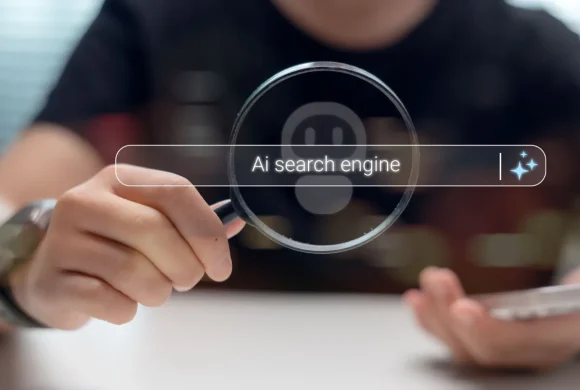The human touch in marketing; Trust beats automation


Language is complex, and what a person says can be interpreted in many ways, depending on tone, context, authority, and a myriad of influencing factors. I understand the vagrancy of miss, let’s call it interpretation rather than communication. My wife is Danish, and English is her second, no, actually third or fourth language. Danish, German, Swedish, and then English. When she arrived on our shores, she set about learning the language by reading anything in English she could get her hands on. Now her understanding of English is very polished.
At home, we watch content from Europe. I am not multilingual, so I need the subtitles. Often, I’ll pause the show and ask her if the translation is accurate. “Pretty close, there are no words in English for what they are saying, it means” And she’ll interpret the meaning, and I can follow along without losing the show’s plot. Recently, we watched an English show with subtitles, and they were terrible. Every third word was inaccurate, and sentences were cut short or untrue to the dialogue.
“What’s going on? This is the worst subtitling I’ve ever seen.” She asked.
My response. “The producers have replaced the person with AI”
The human touch had been replaced by an automation that couldn’t successfully interpret, so the show lost its lustre. Worse, viewers who relied on the subtitles would not have understood the show’s intent. Misinterpretation can derail any story, and the trust evaporates.
Automation and AI have their place
Now, before you go into a spin and think I am attacking the integrity or benefit of AI because I make a living from penning content, I will set you at ease. I love AI. It is a tool I use daily and a resource of measurable value. Its ability to interpret data is beyond comparison and a game-changer in research.
The tool has enabled my colleagues and me to work smarter and more efficiently. It has helped us hone our SEO and GEO skills and identify areas for improvement with pinpoint accuracy. For our clients, it has opened another window to reach new potential customers with an elevated level of human interaction. “What?” “AI is elevating human interaction?” From a written content perspective, AI is forcing us to be more human-centric writers. And for that reason alone, I am a convert.
“AI is forcing us to be more human-centric writers. And for that reason alone, I am a convert.”
How can an artificial intelligence possibly make us more human?

It is a fair question, and I am only talking about my field of content writing. At first, AI as a writing alternative set off a chain of panic responses. Several businesses thought, “Wow, we can drop our content costs, and AI will do it. Friends asked me if my career, and I have been around when liquid paper was used, was ending. What has come to light is that human connection through human storytelling is the standout in the marketing space.
People can tell when what they are reading is AI-generated. While it can, in most cases, deliver the facts, it can’t provide the story or interpret the facts as intended. There is a disconnect that leaves the reader feeling, I will repeat that word, FEELING, underwhelmed, disappointed, or maybe a bit ripped off. And that erodes trust.
“People can tell when what they are reading is AI-generated… there is a disconnect that leaves the reader feeling underwhelmed.”
Secondly, AI bots have an insatiable appetite for human-written content. They demand answers to human-generated questions. When briefing an AI bot on what you want or need, you ask it in a human voice. It needs to respond with a human instinct and interpret your question with a human touch for you to be able to make sense of its response. That is a skill it cannot do, and AI tech creators know it. Content marketers have figured this out; if not, they better get on board.
AI companies are constantly advertising positions for writers to train AI tech, and for good reason. Businesses that have chosen human-written content over AI-generated are reaping the rewards. They’re much more relatable; their content is being used to fuel AI search, and they are being referenced with greater consistency. When you type a question into Google, for example, “Most trusted accountant in Sydney,” the AI will summarise its response, looking for which accountants’ websites are loaded with trust-related content that it can recommend. It would have no idea who the most trusted accountant in Sydney is. It can only summarise what is on the internet, and it always favours human-written, authentic content.
Harness AI's potential, and don’t underestimate the power of connection
Regardless of your business, ultimately, you’re selling something to someone. Salespeople will always tell you that sales come down to relationships; the story is a big part of the process. Stories create connections; it is how humans interpret what they like and don’t. As content writers, we must tell our clients’ stories and interpret their brand as intended. Once your story loses its human touch, you lose your model of care and connection.
While automation and AI are part of our daily lives, trust will always be a human-to-human interaction.
“Once your story loses its human touch, you lose your model of care and connection.”
Brilliant Digital is well positioned to help you
The team at Brilliant Digital has been successfully telling our clients’ stories for over 15 years, many of which now dominate the evolving face of AI search. We’re committed to human-centric marketing because we know it works. We are a leading growth engine harnessing the power of AI for the right reasons and helping B2B businesses maximise their online marketing efforts.
Contact us today for an insightful discussion with our lead strategist, Deb Croucher. We know SEO, GEO, and how to turn visitors into genuine, qualified leads.

About Deb
Meet the author
Deb Croucher is the founder of Brilliant Digital. She works directly with SME owners to create strategy-led, full-service marketing that delivers, not just in Google, but in the new world of AI-powered discovery.

Let’s Grow Your Business Together
Key Takeaways
The Human Touch in Marketing – Trust Beats Automation
Should I use AI to write my website content?
Many SME owners are exploring this, and the short answer is: only if it supports, not replaces, your voice. AI tools help speed up research and generate rough drafts, but human-written content builds trust. People can tell when content is robotic. If your brand voice matters (and it should), AI alone won’t deliver.
Does AI replace the need for human-written content?
No. AI can’t tell your story the way you can. It lacks emotional intelligence, intuition, and nuance. Trust and connection come from real human insight, not perfect grammar or quick answers. Businesses that rely solely on AI content often sound sterile, and that disconnect can erode customer confidence.
Why do people say AI content “feels off”?
Because it often is. Readers today are savvy. They can spot the absence of authenticity, tone, or intent in AI-generated writing. It might be factually accurate, but emotionally empty. Trust depends on how content makes people feel; AI just doesn’t know how to do that well.
How does AI content impact SEO and trust?
SMEs are rightly asking if AI-written blogs and pages help or hurt rankings. Here’s the truth: Google and AI tools prefer human-generated content when recommending sources. If your content is written to help people, not just to fill a page, it genuinely ranks better, builds trust, and is more likely to appear in AI-generated answers (GEO).
Why is storytelling so powerful in marketing?
Because people remember stories, not statistics, when your marketing tells a story about your values, your customers, or your outcomes, it creates an emotional connection. This drives engagement, loyalty, and most importantly, trust. And trust is the real currency of modern digital marketing.
Can I just train AI to sound more human?
Many SMEs are searching for ways to “fix” AI tone, but it’s not simple. AI can simulate language, but it doesn’t understand meaning or emotion. You can prompt it endlessly, but it won’t replace a skilled writer who understands your brand and audience. This is why companies like Brilliant Digital invest in real storytellers supported by smart AI tools, not the other way around.
How should I be using AI in my content strategy?
Use AI for what it’s good at: data analysis, keyword research, and trend spotting. Let it help you work faster and smarter, but keep humans in charge of message, tone, and meaning. AI is a powerful assistant, but your customers want to hear from you, not a bot.
Can AI content damage my brand?
Yes, especially if it’s generic, inaccurate, or emotionally tone-deaf. Think of a show with bad subtitles: even if the core message is there, the meaning gets lost, and trust disappears. The same happens when content doesn’t sound like you or reflect your brand values.
Are businesses really getting better results with human content?
Yes, and it’s something SME owners are actively noticing. Companies that prioritise authentic, helpful, human-written content are not only seeing better engagement from real users, but their content is also being referenced more consistently by AI search engines.
What do AI platforms actually look for in content?
They look for clear, trustworthy, well-structured content that answers real questions. The twist? They rely on human-written content to do that. When someone asks Google or ChatGPT for “most trusted accountant in Sydney,” the AI doesn’t know the answer, it just pulls from sites with content that builds trust. You won’t be included in the answer if your content isn’t helpful or human.
Can AI help me create better content?
When used strategically. AI helps you analyse, refine, and identify opportunities. It’s great for research, SEO optimisation, and productivity. But the real results come when you take those insights and apply human creativity, tone, and emotional relevance.
How can Brilliant Digital help me balance AI and human marketing?
At Brilliant Digital, we specialise in human-first content strategies backed by smart AI insights. We know what real customers respond to — and we know how to keep your brand voice strong and authentic. Whether it’s SEO, GEO, or compelling storytelling that builds trust, our team brings the best of both worlds: technology that works behind the scenes, and writers who speak your audience’s language.









